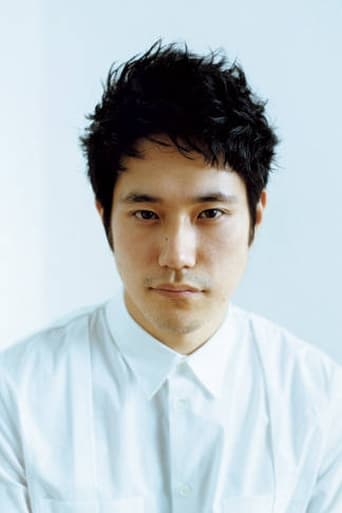Norwegian Wood (2012)
Toru recalls his life in the 1960s, when his friend Kizuki killed himself and he grew close to Naoko, Kizuki's girlfriend, and another woman, the outgoing, lively Midori.
Watch Trailer
Free Trial Channels
Cast


Similar titles
Reviews
One of the worst movies I've ever seen
it is the rare 'crazy' movie that actually has something to say.
Through painfully honest and emotional moments, the movie becomes irresistibly relatable
One of the best movies of the year! Incredible from the beginning to the end.
Set in 1968 this film follows the life of Toru Watanabe during a particularly troubled time in his life. His friend Kizuki took his own life a few years previously and quite by chance Toru bumps into Kizuki's former girlfriend Naoko; one thing leads to another and they sleep together on the night of her twentieth birthday. She hasn't got over Kizuki though and spirals into depression and moves to a sanatorium in a forest near Kyoto. While she is there Toru meets another girl, Midori and they become friends. He is attracted to her but loves Naoko. He is conflicted as to what he should do; Naoko represents a past he can't forget and Midori offers a chance for a new, brighter future for him.I can't say how this compares to the novel as I've not read it, however I really enjoyed the film. It is told as a fairly gentle pace and looks beautiful in the scenes in the countryside. It gets off to a fairly downbeat start as we see Kizuki killing himself and there is the constant feeling that he may not be the last person to take their own life and indeed he isn't. The characters feel more real than those in many romances as we see the various difficulties they face. Sex is dealt with in a fairly matter of fact way; characters discuss sex and sexual problems is surprising detail and when they do get intimate it has a slight awkwardness not usually seen during such scenes in most movies. The cast put in solid but fairly restrained performances. Overall I'd recommend this to people looking for something a little different.
"I guess I've been waiting so long I'm looking for perfection. That makes it tough.""Waiting for perfect love?""No, even I know better than that. I'm looking for selfishness. Perfect selfishness. Like, say I tell you I want to eat strawberry shortcake. And you stop everything you're doing and run out and buy it for me. And you come back out of breath and get down on your knees and hold this strawberry shortcake out to me. And I say I don't want it anymore and throw it out the window. That's what I'm looking for.""I'm not sure that has anything to do with love," I said with some amazement."It does," she said. "You just don't know it. There are times in a girl's life when things like that are incredibly important."=====It's best to see that scene within the correct context. At the beginning of the movie, you have major student protests, confrontations between faculty and students over the relevance of Greek literature to political life--not seeing anything that isn't immediately personally relevant as relevant at all. The book, then, presumably takes place in '68 and I think should be taken as an exploration of that massive event. The political upheaval, the sexual liberation and libertinism, the conflict between traditional and modern values, the sense of alienation, the narcissism of Midori. As you know, second wave feminism was born from the 60s; in one of the early conversations I had with my girlfriend (not yet a girlfriend), I asked her if she knew what feminism is, and she responded, "it says that women should be better than men." I laughed, quite shocked.I think this is the proper context and way to read the scene--1960s narcissism. In this sense, the movie is a very typical, perhaps even ubiquitous, exploration (and critique) in Japanese cinema between tradition and cultural change. You know that the title Norwegian Wood is taken from a 1965 Beatles song.Where Toru's relationship to Naoko seems to represent tradition (by way of his virtuous sense of obligation), Toru's relationship to Midori is much more modern. First, Midori is definitely much more dynamic, aggressive, forward than Naoko: Midori is something of a modern Japanese young woman trying to find her way. And second, and more obviously, the relationship between Toru and Midori comes at the end of a spate of Toru's womanizing. Reinforcing these themes is the subplot between Nagasawa and Hatsumi--Hatsumi ultimately committing suicide because of the infidelity and coldness of Nagasawa, whom she loves. So, on the surface, Naoko represents tradition, which ultimately becomes schizophrenic and commits suicide, and Midori represents the vitality, although uncertain, of the future.But note that Midori redeems herself by waiting for, and ultimately forgiving Toru for rejecting her in favor of his traditionally Japanese obligation toward Naoko; this ushers in a new beginning, on the note of which the film ends. How to account for the capitulation of the narcissistic ethos--in the name of love? Read at a deeper level, Naoko rather than Midori is the true exemplification of uncompromising narcissism.First, note that one of the central plot elements (at least in the film) is that Naoko can't have intercourse because her vagina can't get wet. She never had it with Kizuki, whom she insisted on several occasions to have genuinely loved; she had it only once with Toru. Ultimately, this incapacity for sexual intimacy is a significant contributor to her madness. But, when is the one time when she can get wet, when she has intercourse with Toru? It's prior to her commitment to Toru: it is prior to the commitment to genuine emotional engagement. The only time that she is capable of vaginal wetness is in the fulfillment of bodily pleasure, in the absence of emotional bond to the Other, in a situation where she does not wither in self-consciousness in the gaze of the Other: narcissism sine qua non. Ultimately, her incapacity for physical intimacy is inextricably linked to her madness: her incapacity for physical intimacy mirrors her simultaneous rejection of relationships with others--with her hyperreflexivity, constantly talking about herself, driving herself mad with thoughts about her own self and own feelings, etc.--and ultimate suicide.Here we are starting to see most clearly the focus on the thematic of alienation--of separation of person from person, of personal isolation--that is one of the major subjects of the film, whether through sexuality, through madness, or in extreme conceptions of love. Midori, although appearing to be a real piece of work after her dialogue about love, forgives Toru, so we should be inclined to forgive her. She is a young woman who struggles with contrary conceptions of self, but unlike Naoko, who uncontrollably spirals into herself, escapes into the fantasmal past, and toward suicide, she ultimately compromises with her emotions, and indeed her stated ideal of love--and in a rather conservative conclusion, fulfills the classical motif of the woman faithfully waiting for her man while he is away on a personal journey (seen first in Odysseus and recapitulated throughout the Western literary patriarchy).Does not, then, Midori in fact fulfill a traditional female role, or at least move toward it in a modern way, whereas Naoko is the one who exemplifies inflexibility and the descent into the self and self-destruction? Midori shows herself as a maturing young woman, originally with flawed views and an egregious and possibly insulting stated worldview, but who ultimately compromises her own narcissism for her love of Toru-- even as she claims not to understand Toru's commitment to Naoko. Like in Pulp Fiction, the vision of the film points toward the future rather than the past, but it simultaneously recognizes the logic of the traditional past without inflexibly adhering to it--as when Butch cuts down The Gimp and incapacitates Zed with a samurai sword but rides away on a motorcycle.
The poet Rilke said, "There is only one journey. Going inside yourself. Here something blooms; from out of a silent crevice an unknowing weed emerges singing into existence." The unknowing weed takes its time to sing but sing it does in director Tran Anh Hung's film Norwegian Wood, his first since Vertical Ray of the Sun in 2000. Based on the best-selling 1987 novel of Haruki Murikami (which I haven't read), the film reflects the inner journey of 19-year-old Toru Watanabe (Ken'ichi Matsuyama), a journey that embodies the pain of love and loss, the tantalizing embrace of death, the end of dreams, and the beginning of adult responsibility.Scored by Jonny Greenwood with some narration by Watanabe, the film takes place in Tokyo in 1967 in the midst of student protests against the War in Vietnam. Trying to ease the pain of the shattering loss of Kizuki (Kengo Kora), a close friend from high school, Watanabe immerses himself in his studies at school where he is majoring in drama and, with Nagasawa (Tetsuji Tamayama), an older and more experienced friend, is able to release his tension by going to bars and picking up girls for sex. Things change, however, when Kizuki's former girlfriend, the beautiful but emotionally fragile Naoko (Rinko Kikuchi), shows up in Tokyo and reaches out to Watanabe for consolation. Though their language is exceedingly frank and sexually explicit, it is vital to understanding the characters and never used to titillate.Their deepening relationship, however, only brings the feelings of loss closer to the surface and Naoko's ensuing emotional breakdown causes her to leave Tokyo for psychological rehabilitation at a mountain retreat where she is only able to see Watanabe intermittently. Even on occasional meetings, however, they embrace a dark ecstasy that inures them, at least temporarily, from their mutual grief, but when Naoko's roommate, music teacher Reiko (Reika Kirishima), sings the Lennon and McCartney song "Norwegian Wood" at Naoko's 20th birthday party, the line "and when I awoke, I was alone, this bird had flown," evokes tears that flow naturally.Paralyzed by her sadness and feelings of responsibility for Kizuki's death, Naoko sinks deeper into despair and Watanabe's vows of lifelong fidelity are compromised by his attraction to Midori (Kiko Mizuhara), a smart, outgoing student who also has had to overcome a troubled past. Norwegian Wood is not a film about "teenage angst," or any other of the favorite catch phrases that substitute for empathy, but about the essence of life itself and the anguish of having to let go of attachments. More of a tone poem than a free-flowing narrative, the film creates an indelible experience of both exquisite beauty and aching pain, perhaps two sides of the same coin. Like the under-appreciated Tony Takitani, another film based on a story by Murakami, Norwegian Wood unfolds like a dream, evoking a mood of serenity and contemplation.Supported by the stunning cinematography of Ping Bin Lee, much of the film's power takes place in the silences that allow us to simply observe the sublime beauty of the countryside, its forests, waterfalls, and the purity of its winter landscapes. While some may try, the film's emotional roller coaster cannot be filtered out and, in the process of assimilating it, it builds a quiet power that ensnares us and leaves us to explore its meanings long after the final credits. In spite of those who want to attach the label of "boring" to every film that moves slowly and requires concentration, Norwegian Wood will be remembered as one of Hung's best films and a work that brought cinema to a new level of artistic achievement.
"Norwegian Wood" is dreary, unfocused, and unreasonably slow-paced. It involves characters so dour and unlikeable that investing in them takes nothing less than sheer will power. They each find themselves in relationships so emotionally complicated that never once do we see a process of connection at work; we can only marvel at the fact that these people have somehow found their way into each other's lives. Not only do we not understand their reasons for being together, but on the basis of what unfolds, no one is the better for it. Here is a coming of age drama so confused and needlessly drawn out that we're anxious for the moment when the hero finally grows up – which, in this case, has nothing to do with witnessing a beautiful act of transition and everything to do with ending two miserable hours sitting in a theater.Adapted from the novel by Haruki Murakamki, the film has been structured by writer/director Tran Anh Hung in the most curious of ways, namely to make every single scene play like the finale. When you have a movie filled with ends, you will inevitably invite speculation as to how it all began, and it's incredibly unfair to deprive audiences of answers. Some scenes are just plain awkward in their length, pacing, and exploration of characters that have no bearing on the central plot. It's almost as if clips from an entirely different movie had been randomly spliced in by editor Mario Battistel, perhaps because he was feeling a bit mischievous and wanted to get audiences off of what narrow a trail there was to follow. If that was his intention, he succeeded. This story leads us nowhere in particular, except in circles.It takes place in Japan during the late 1960s, the era of the Vietnam War and a time of great social unrest. You'd think that, given this rich history, the filmmakers would actually make it a part of the plot. But no – history is reduced to a handful of brief shots, all of disorganized student protests that immediately fade into the background. Because it's barely a backdrop for a soapy story of love and loss, this movie could have taken place anywhere at any time. It's told from the point of view of nineteen-year-old Toru Watanabe (Ken'ichi Matsuyama), who moves to Tokyo and enters college following the inexplicable suicide of his best friend since childhood, Kizuki (Kengo Kora). Why this is left unexplained, I have no idea. I, for one, would have appreciated knowing what made Kizuki so unhappy that he felt the need to poison himself with exhaust from his own car.Toru forms a relationship of sorts with Kizuki's girlfriend, Naoko (Rinko Kikuchi), who also knew him since childhood. Ever since his death, she has not only fallen into a deep depression, she has also lost all traces of her sexuality. She will make repeated attempts to find it throughout the movie, at first by submitting herself to Toru on the night of her twentieth birthday, the rest of the time through sexual advances she initiates. Alas, it's to no avail; she's incapable of feeling anything physically, while emotionally she retreats further into herself. Her mental state has landed her in a sanitarium buried in the forested mountains of Kyoto. I use the word "sanitarium" loosely, as it isn't made to seem like one. If anything, it comes off as a spiritual retreat for the musically inclined.Toru occasionally visits Naoko, and will even exchange letters with her. He might even have feelings for her, although you'd never know it by looking at him; as Toru, Matsuyama gives a performance so statuesque and soft-spoken that never once does an emotion leap off the screen. Regardless, Toru finds himself torn between Naoko and one of his classmates, a young woman named Midori (Kiko Mizuhara), equally as soft spoken but far more outgoing. At times, she's developed to the point of oddness, and if you watch the scene where she calls Toru after the death of her father, you'll know exactly what I'm talking about. The worst thing about this character is that her interest in Toru stems from nothing made clear to the audience; she, like everyone else in this movie, has no clear purpose apart from being doing and saying miserable things.In spite of the characters, the plot, the structure, and the performances, a connection still might have been possible had it not been for the horrendous soundtrack. On the one hand, we have samples of sleep-inducing folk rock hits of the era, including the Beatles song the film derives its title from. On the other hand, we have Jonny Greenwood's score, which is comprised of depressing and emotionally manipulative violin dirges. Most of it plays during the latter half of the movie, at which point the story goes from solemn to outright devastating. Listening to both the score and the songs, one wonders if anyone involved in the film has ever laughed, or even knows what laughing is. For films like "Norwegian Wood," joy and happiness are treated as foreign concepts that get lost in translation.-- Chris Pandolfi (www.atatheaternearyou.net)


















